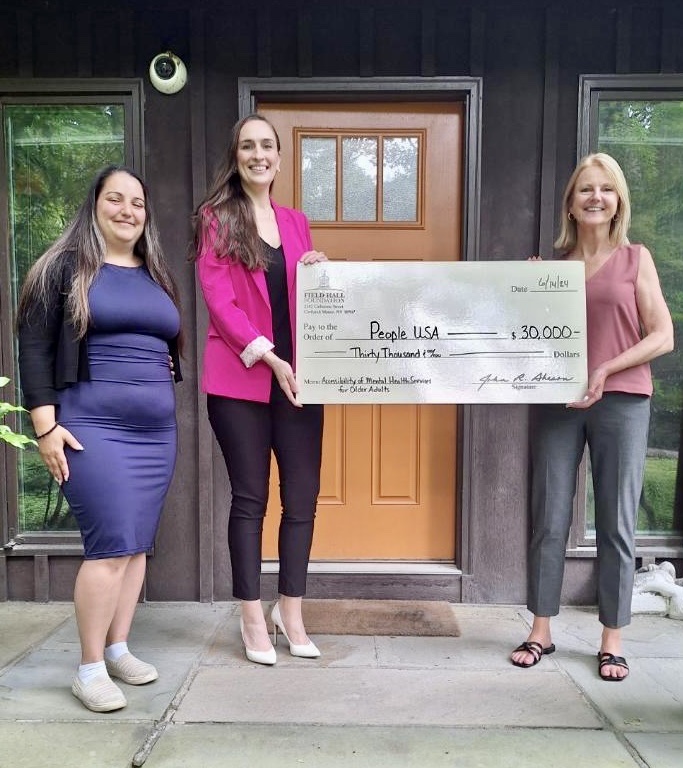We are thrilled to announce that People USA received a $30,000 grant from the Field Hall Foundation to support our work with participants ages 60 and up, a population that is extremely underserved when it comes to mental health.
Thanks to the Field Hall Foundation’s generosity in 2021, we have already been able to make great strides towards our goal of better serving this vulnerable demographic. This year, we will be able to go even further in ensuring that more seniors have safe access to our services and are supported by our programs.
A huge thank you to the Field Hall Foundation Board of Directors and to Patti Horvath, Program Officer. Patti is pictured here with Kristen Vaphides, Development Manager, and Maria Kavouras, Assistant Executive Director of Operations, outside of the Putnam County Rose House respite where much of the grant’s funds will be directed. We are so grateful!
1) Capital Improvements for Safety and Accessibility at Putnam Rose House Crisis Respite
Under the supervision of our Facilities Manager, White Oak Landscaping & Stoneworks would demolish the existing cobblestone walkway leading up to the house, which contains many cracks and holes that make it unsafe to walk on. They will then excavate the walkway at 12” deep to allow for 8” of compacted ¾ stone and 4” of concrete. The walkway will be 3’ wide and 4” thick and will fan into a 6’ staircase with a concrete ramp on one side. The work would begin immediately upon receipt of the funds and would be complete within 6 weeks.
2) Transportation Vouchers for Putnam County Rose House Guests
Transportation is always a challenge for our low-income participants, and therefore always a challenge for us to accommodate. It is even more difficult for this population, as many no longer drive. Transportation vouchers would allow us to utilize cabs for participants when they need transportation to or from home, the Rose House, the Dutchess County Crisis Stabilization Center, the Putnam County Crisis Stabilization Center (opening January 2025), medical appointments, and other linkages within People USA or externally.
3) Community-based Mental Health & Socialization Groups for Seniors (“Nights Out”)
The mission of our “Nights Out” program is to provide a comfortable environment where participants can socialize in a non-institutional setting. Utilizing several evidence-based practices, the goal is to assist people in developing the confidence to link with natural supports in the community. Group session topics can include loneliness, resilience, anxiety, depression, and more, with sessions sometimes featuring therapeutic arts & crafts or other recreational activities. Currently, we host these sessions weekly at the People USA office and occasionally out in the community.
We aim to extend the program to include a new weekly “Nights Out” group specifically for the 60+ community, rotating our location between senior facilities, the community, and People USA offices. Sessions would provide socialization and peer support, helping with feelings of loneliness and isolation. They would also provide education and resources, ensuring that more adults over 60 get access to the mental health supports they need to thrive. We plan to extend the hours of a currently staffed Recovery Peer Specialist and begin outreach to senior facilities at the outset of the grant cycle.
4) Furnishing Vouchers for the Newly Housed Ages 60+
As part of People USA’s 2024-2027 Strategic Plan, we conducted interviews with our leadership team to identify the organization’s needs beyond what the current grants cover. When asked, 100% of Supportive Housing leadership reported that participants need additional financial support once they are housed to get them set up for success in their new space.
Our Director of Supportive Housing, Dominick Marino, and four Housing Coordinators in Dutchess and Putnam Counties would be able to go the extra mile in delivering compassionate, person-centered care. Once a participant aged 60+ is placed in housing (from homelessness or other housing issues due to substance use disorder or severe mental health concerns), Housing Coordinators could spend $500 on basic apartment needs like a bed or bedding, cooking supplies, a microwave, a couch, a TV, etc. For some, these items might include bathroom safety rails, shower chairs, night lights, and other special needs they may have to support their safety. This would allow for an easier transition and a higher probability that participants stay housed, avoiding hospitalizations, and other instances like newly housed participants sleeping on the floor or eating strictly fast food because they lack the supplies to cook a meal at home (actual examples of former participants). The initiative could begin with the first 60+ individuals that enter this program, with funds being used by the end of the grant period.


